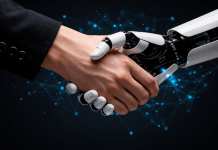Intelligent automation and big data are the next frontiers in the corporate world’s continuous drive toward greater efficiency and competitive advantage. According to Accenture, companies which have leveraged intelligent operations to become “future- ready” to the greatest extent possible are about three times more profitable and twice more efficient than the field.
This trend will be just as transformative for the sales industry as for any other. But what will it look like on the ground for the average sales team?
Just as cars have different levels of autonomous driving capabilities, which they have achieved or will achieve over the coming years, so too do sales processes — ranging from primitive CRMs to complex intelligent assistants that will revolutionize how reps sell.
Let’s use the Society of Automotive Engineers’ six tiers of autonomous vehicles as a framework.
Level 0: No Assistance
The vast majority of driving is still fully manual, with the driver controlling all the car’s basic functions. The same is true in the sales industry, where many salespeople still use the Notes app on their iPhones (or even a real notebook!) to manually track clients’ key requirements, birthdays or a log of past interactions. These functions could and should be automated.
Level 1: Basic Assistance
At Level 1, the machine helps by taking over a constant basic task, such as maintaining a level speed. Chrysler first introduced cruise control to the masses in 1958.
The sales analogues here are the first rudimentary tracking systems, digital Rolodexes and CRMs like Siebel Systems. Introduced in the early 1990s, these stored key dates, requirements, a ledger of past interactions, a calendar for upcoming interactions and more.
Level 2: Partial Automation
Level 2 describes rules-based automation, in which the machine can reliably execute simple tasks based on constant rules. This would include adaptive cruise control, a now- common feature.
Many salespeople employ this level of automation to some degree already to set reminders, make predetermined calculations based on certain inputs, or schedule meetings based on pre-set parameters.
Level 2 represents the lowest-hanging fruit of automated assistance, saving salespeople a few extra hours a week and pre- venting important basic details from falling through the cracks.
Level 3: Conditional Automation
Whereas Level 2 cars use simple rules and small data sets, cars at Level 3 use complex rules and large data sets to drive autonomously with supervision. Functioning like a real intelligent co-pilot, they can accelerate, brake, stay in their lane and even take more sophisticated actions like turns.
An intelligent co-pilot in sales might highlight select items to follow up on, recommend certain callbacks, score leads and prioritize items in the pipeline. Like the Level 3 car, the Level 3 sales assistant will inevitably have its recommendations overruled at times by the human salesperson. There will also be plenty of instances in which the assistant doesn’t offer a recommendation, because the situation is outside of its operating scope.
So while the tasks performed are complex and helpful — saving a salesperson five to 10 hours per week — they are still at their core rules-based and subject to the salesperson’s approval. There remains a great deal of potential for growth at this level within the sales industry.
Level 4: High Automation
A Level 4 intelligent assistant performs data analysis, which a human driver or data scientist may have performed, and is thus trusted to a high degree. Functionally, Level 4 cars can perform fully autonomously, with the human napping in the back seat, but only in prescribed areas and times. There remain certain tasks which a human driver can do — driving through a heavy storm, for example — that a Level 4 car might not attempt.
Critically, Level 4 systems are no longer strictly rules-based, but are instead self-learning, taking every shred of data into account to notice patterns and improve their own models and performance. They are not dependent on any narrow original set of rules.
The sales intelligent assistant will offer novel, unexpected and helpful suggestions which the salesperson might not have discovered. Like the self-driven car, a Level 4 sales assistant can understand the salesperson’s desired outcomes and can be trusted to craft its own strategies to reach them.
It might show, for instance, that you achieve higher success selling to certain demographics at certain times of day, or that you close more deals when certain members of a buying team are involved. By generating helpful insights and acting on them at a basic level, the intelligent assistant is also building an irreplaceable spot for itself in your workflow.
Level 5: Full Automation
Level 5 cars might not have a steering wheel, because there’s nothing a driver ordinarily does that a Level 5 driving assistant can’t do.
Until Level 5, salespeople and drivers were still responsible for some executive oversight and a certain degree of vetting. At Level 5, however, a sales assistant is determining best actions, structuring the salesperson’s day and handling a portion of the work. Nothing is slipping through the cracks, and customers are enjoying an even greater experience.
This level of automation could increase a salesperson’s productivity by 2x or 3x, enabling them to work less (25-hour work week, anyone?). The lion’s share of their time at work would be devoted to the truly creative, inspirational and direction-setting tasks, which computers will never be capable of, while their time outside work would be enriched.
To successfully make it to Level 5, however, high-quality integrated data is a must. That’s why several car manufacturers and tech companies in the autonomous vehicle space have been collecting this data aggressively for years to train their models.
For businesses, consulting with data specialists that understand the sales industry will ensure that the data you’re collecting will be usable for the advanced automations and intelligent assistants coming online and speed your implementation. Unifying your data platforms into a single, cohesive system with Level 5 automation will require investments of time and money. The companies that stay the course will be set up to win big — and change the world.




